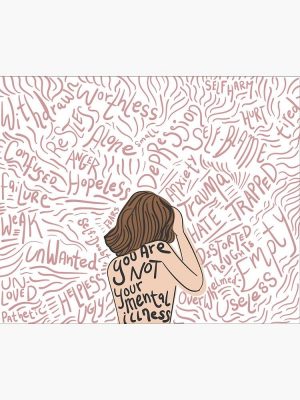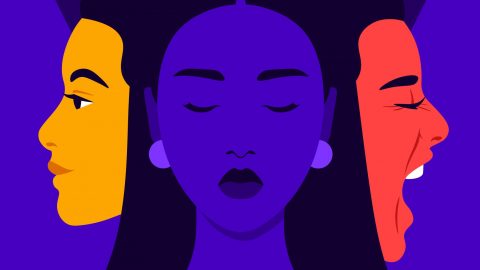Cultural Views on Mental Health:
In many cultures, mental health is a topic that is often left unspoken due to the overwhelming stigma that surrounds it. You might be able to relate. Maybe your culture generally views mental health as something that only “weak” people experience challenges with, or that such a topic is not meant to be spoken about publicly and is “taboo”. These are only a few of the many stigmas that are attached to the topic of mental health.
Ultimately, in many cases, this stigma attached to mental health disencourages individuals experiencing challenges with their mental wellbeing from coming forward and seeking help for fear of repercussions or judgement from those who are in many cases, closest to them. Because of this, these individuals may feel alone and alienated, left wondering if they are the only ones experiencing these struggles, or if, they were to blame for it all. They feel invalidated.
As we discuss in the podcast linked below, invalidating mental health come in many forms. Verbally, it may often sound like:
- “You’re well off, you have no reason to feel bad.”
- “You should feel lucky, what are you feeling bad for yourself for?”
- “It’s just a phase, get over it.”
But, I cannot stress this enough: your mental health concerns are valid. You’re valid.
Mental illness does not discriminate. It is universal and affects everyone. Thus, mental health is a conversation that should be had with AND for the sake of everyone.
How One’s Culture Impacts Their Own Perspective on Mental Health:
The culture that we are surrounded with growing up often has a large impact on our perspectives, including how we, as individuals, view our own mental health.
Growing up in some cultural communities, we may have been taught to push away and hide the current emotions we may be grappling with in order to maintain this “perfect version” of ourselves that we were taught to present ourselves as in society. We may have even been taught that mental health issues are “all in the head” and “not real.”
These can be difficult things to hear, especially when you may be struggling with your own mental health at the same time that you are surrounded by these perspectives.
Nonetheless, despite what you may have learnt growing up, your mental health is important. Struggling with mental health does not make you weak, it makes you even stronger.
It takes a lot of strength to:
1.) Recognize that you need help
2.) Seek help
Once again, it is CRUCIAL that you do not invalidate your own feelings. They are valid.
Remember, you are not your mental illness.
How You Can Help Shatter the Stigma Surrounding Mental Health:
Shattering the stigma surrounding mental health opens up so many doors for everyone. It all starts with people like you taking action, being a part of the catalyst for change in our society, whether it be through:
- Educating yourself about mental health
- Spreading awareness about mental health to others (using social media, etc.)
- Support and check up on your loved ones (this, without you even knowing it, could make a large difference in someone’s life)
If you take away just one thing from this blog please know YOU are NOT alone.
In fact, according to the Canadian Mental Health Association:
- “In any given year, 1 in 5 people in Canada will personally experience a mental health problem or illness.”
Take time to feel and express your emotions, even if it can be scary. These are what make you human. Learn to embrace vulnerability.
You know yourself best and your feelings and concerns are all valid.
Do not suffer in silence. You deserve to be heard and to be supported and you deserve to talk about your feelings. In fact, you owe it to yourself to talk about them.
Its time to:
“Name it, don’t numb it.” – Canadian Mental Health Association
Interested to learn more?
Check out our podcast interview on the Free Your Mind Mental Health Society Youtube channel in the link down below where we further dive into “Exploring Intercultural Perspectives on Mental Health:”
Link:
Note: The Free Your Mind Mental Health Society is an independent youth-led organization. The contents of this blog are not intended to be a substitute for professional medical advice, diagnosis, or treatment. Always seek the advice of your physician or another qualified health provider with any questions you may have regarding a medical condition. In the event of a medical emergency, please call your doctor or 911 or other local emergency numbers immediately
Summer Transitional Reset – High School to College
The summer before college will be one of the longest educational breaks you will have! Take time for some self-care, mental health reset, reflection, and planning. College is a once-in-a-lifetime experience and a step to being an independent adult. But honest this blog could be applied to any transitions in life Committing to a school […]
Who are you when no one is watching?
The question “who are you?” can be very complicated, especially for young adults who are still developing their sense of self. At 19 years of age I am still working on figuring out what I value, what I enjoy and what I want in life, as with many others. However, I have found that it […]
Workplace Stress: Knowing your Limits
Working is prevalent amongst almost all populations. High school students, university students, and adults will encounter work at some point in their lives as it is an economic means of survival. Working at a job is almost inevitable in life- unless you come from a billionaire family – then there will be a time in […]
How to Respond When You’re Frustrated: Emotional Dumping (Reacting) vs. Healthy Venting (Responding)
There comes a time when we just need someone to be there for us and we need to vent. If you’re an empath like me, experiencing emotional dumping feels like one is drained and exhausted after receiving or unloading your emotions. When we are feeling emotions that trigger us, it is important to communicate those […]








